You’ve probably heard a lot already, that continuous learning is a key to success.
If you know me, you probably heard that from me, including in a recent post (see “The advice I always give when mentoring“).
I still wanted to make this the first post in the series, because
- it remains the foundation, the building block of so much of the rest.
- some people expressed the desire to get more actionable tips .
The bottom line is, learning is the best investment you can make in yourself. It will pay dividends over time. And it has become much easier than in the past.
That’s a generic advice though (which I have given many times myself!), hardly actionable.
So goal here is to share more practical advice.
Defining a goal for your learning
Define what you want, in the near or long-term.
Then identify what knowledge you are missing for it.
Do you want a specific promotion?
What will you need to know to do well in your new position?
Learn now what you will need then.
And use any opportunity to practice that new knowledge. Display it to whoever will make the decision to promote you.
Do you want to start a business one day?
There will be lots of areas where your knowledge is currently lacking. Be it website creation, programming, sales, marketing, finance, etc..
Start learning now – even if you make the jump years from now.
It will maximise your chances of success. And boost your confidence to make the jump in the first place.
Methodology for learning
Once you have defined what you want or need to learn, an important step for me is to define a specific project that will help you make the learning real.
It can be a small project to start with – but it needs to be something you can do yourself.
If you are learning to get a promotion, or to start a business, perhaps it can be putting a plan together for it (look out for one of the next #CareerPlaybook post on that).
If it is to get better at your current job, perhaps it can be how to deliver better looking documents (proposals, presentations, etc..), how to automate a task, or how to understand Marketing better if you are in Sales.
Of course, by reading or learning something new, other ideas will come to you.
But in any case, I found it always better to learn by having a specific project in mind while I do so. It helps connect the ideas to their real-life applications.
And then:
1) start learning: reading a book or attending a course on the topic. It’s fine if you skim over chapters, as long as you take a mental note of the content available in the parts you fly over.
2) start DOING: writing that plan, building that thing, etc…
3) iterate on your learning as needed: while doing, new questions will arise related to the execution of your project. Perhaps you will have seen a chapter in a book or online course that addresses the challenge you are facing. Or you can go on the hunt for another resource that will help you with it.
4) learn to learn: rinse and repeat.
Learning with books
Books are the best distillation of someone else’s learnings (and failures).
Someone who believes they have acquired valuable knowledge, has spent an enormous amount of time putting it together. Re-reading ad nauseam until it’s as perfect as they think they can get it (contrary to say, a lot of quickly written blog posts – yeah, I know, it’s ironic to read that on my own blog post! 😁).
Books are the user manual for you to become better at whatever you have set your mind to.
My experience is that, on any given topic, if you read a couple of (good) books about it, you will have as much knowledge as 80+% of the people in the field (we can argue about the percentage, but you get the gist).
Experience is another topic of course, but at least you’ll have the foundation, lingo (the language used in that field), etc…
The more you read, the more you’ll know – it’s a simple equation.
I do read only 25-40 books or so myself per year. Some read 200 books per year! 😳 No need to go overboard though.
Now, you are probably struggling with finding the time to read – juggling a (high-demanding) job, your social life and entertainment (need to have fun after all!), a relationship or marriage, and perhaps even adorable at times but nonetheless straining kid(s).
I know I did.
Enters:
Kindle
What helped me a lot was to buy into the whole Kindle ecosystem (Amazon’s brand for e-books).

Credit: Reviewed.com – The Best Kindles
First the device itself of course – Kindle e-readers provide quite a few benefits:
- holds thousands of books
- long battery life (weeks)
- good readability without straining the eyes
- no distractions (notifications, social media, etc..)
- I invested in the Oasis, the top of the line model – and reading on it is a true pleasure.
Once you buy a Kindle e-book, you can read it on your device, but also on your phone or tablet with the Kindle app(s).

And it will sync where you are across your device.
You might do a long reading session on your Kindle before sleeping. Then pick up where you left from on your tablet during commute time. And again on your phone during that ever so long bathroom break (fathers are known to spend more “quiet” time there than others – go figure!).
All in all, you are able to progress in your book wherever you are, with whatever device you happen to have with you.
This has helped massively my reading pace.
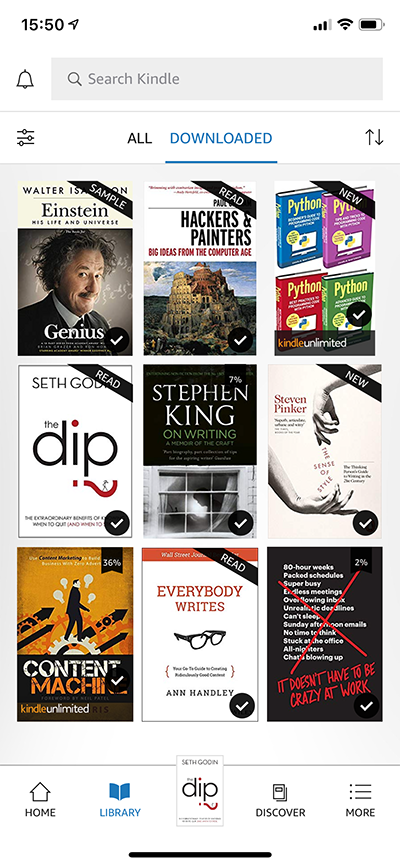
Ooh, and usually e-books are also cheaper than hardcovers – just saying.
That said, if you like the feel of an actual book with paper and all, I get it. Go for it. It just makes the act of reading a bit more challenging (you carry a phone in your pocket everywhere, rarely a book).
Audiobooks
The other thing that has massively increased my reading pace are audiobooks.
I used to look down on audiobooks – “it’s not proper reading!”… “I can’t remember things as well when I listen rather than read”.
Well, I was wrong.
Staying in the Amazon ecosystem, I am using Audible.
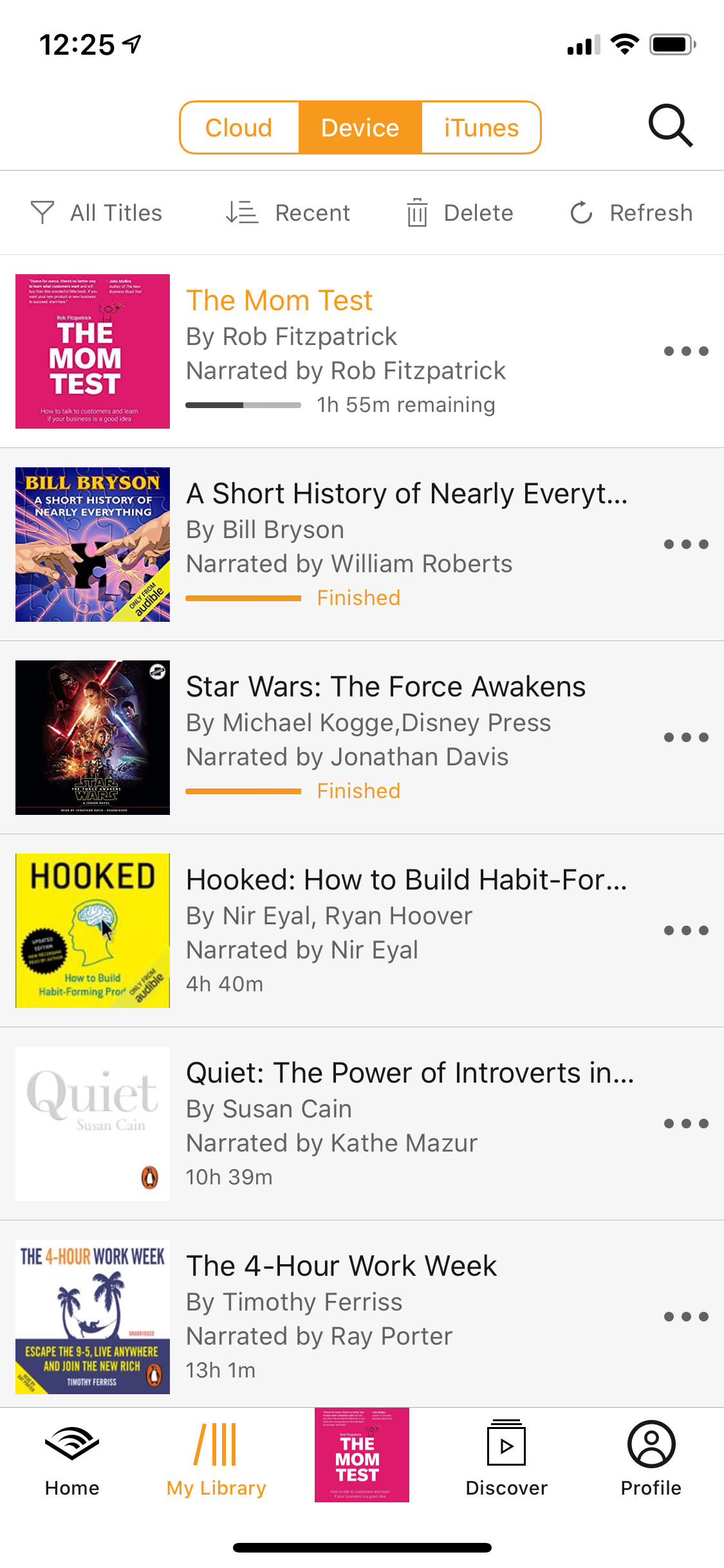
Star Wars is for my kids. I swear! (well… I like it too!)
They offer a monthly subscription, which I recommend. You can try free (1 free book, what’s not to like?) then it’s $15/£8/€10 per month.
Receiving your credit for a new book every month encourages you to pick up a new book – even if you have not finished the last one (yet). So the momentum is maintained.
With audiobooks there is no excuse, you can listen anywhere, while doing something else.
I’m listening to audiobooks while cooking, cleaning, doing the laundry, in my car, travelling or sometimes while falling asleep (some books are great at helping you falling asleep faster 😁).
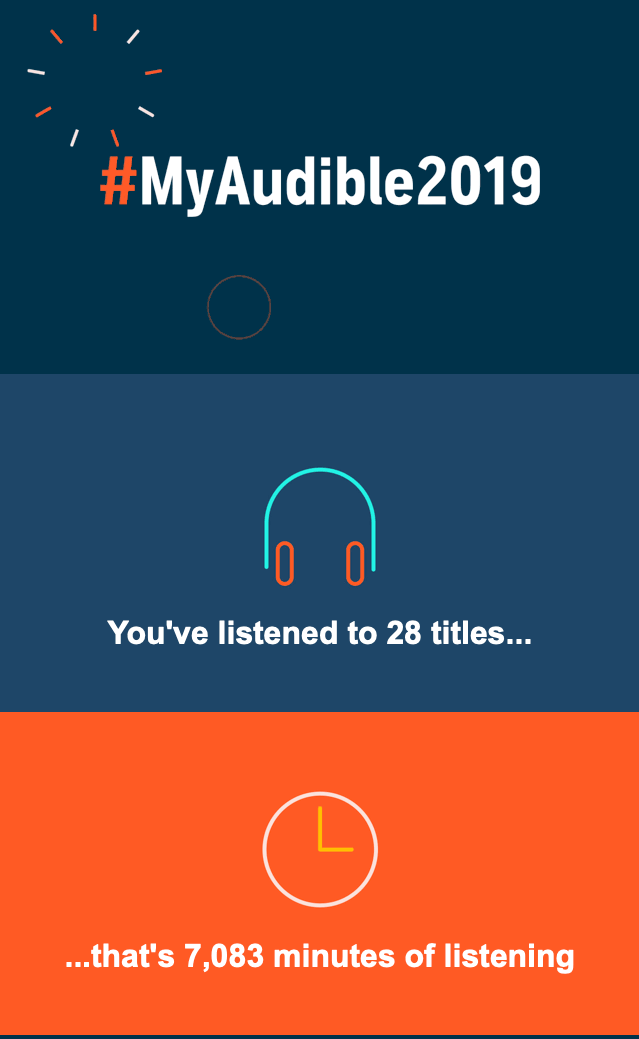
The only downside to audiobooks, is that it’s harder to refer back to it. We’ll get to that below.
Side note to parents of young children: audiobooks are amazing for (long) drives!
How to find books to read
Obviously, you can use:
- your search engine of choice (I use DuckDuckGo as I value my privacy 🤓)
- the recommendation engine and reviews of your online bookstore
- or ask your friendly neighbour bookstore (though they have disappeared mostly these days, especially the friendly ones)
But my primary method for selecting books to read is recommendations from people I aspire to be, respect, or simply who seem to know something I’d like to know myself.
So when someone you respect recommends a book, ensure you check it out. And if it resonates, buy it immediately – even if you read it only later. Or at least add it right then to your Audible wishlist or get the free Kindle sample. So it remains on your “to-read” radar and next time you get your monthly Audible credit or want to buy a book, you’ll have a curated selection to buy from, immediately. If it influenced the person you are looking up to, chances are it will influence you too.
Sure it can be Bill Gates’ recommentations. But this will be at times too high level to provide actionable insights.
But if you listen to an interview of a top salesperson and you want to become one, their recommendation will be more aligned with your needs.
Another way is when meeting people IRL (in real life), that you aspire to get to the level of. Ask them “What book(s) have changed your life?”.
And apply as above.
Go to the top performing person in your company and ask her. Or to your CEO. People usually like to share this.
Taking notes while reading a book

"Yes.. I’m reading about how to write better. Lots of room for improvement as you noticed!"
If you are not doing so already, I highly recommend taking notes while reading a book.
it forces you to summarise key learnings that are resonating with you, making them clearer in your head.
the act of writing down key learnings helps with memorisation.
referring to the notes is quicker than finding again the passage later on.
Some people annotate the book. Fine if it works for you.
What I find works better for me is to have one note for each book, in my note-taking app (I use and love Ulysses, and fill it as I go. It provides more flexibility, and I can access the notes wherever I am without needing to have the physical book at hand. Taking notes is especially important when listening to audiobooks. As it’s hard to refer back to important bits with them.
Not finishing books
I used to have remorses about not finishing a book. Thinking I had wasted money.
These days I do not hesitate to not finish a book, if it does not provide the value I was seeking.
I’d recommend to read at least half though. Some books have a rather long ramp up phase until you get to the valuable pieces.
And in some cases, even if feels like you are reading a foreign language, pushing through can be helpful. I probably understood only 10% of the 1st book I read about programming in Python. But concepts and lingo started making sense after reading the 2nd book, as it was presenting the same things, in a different way. Your brain works in mysterious ways..
If the book’s structure allows it, feel free to jump chapters. But get a feel for what’s in the chapters you’re skipping, so you can take a mental note and get back to it if needed – seeking solutions for challenges you encounter in the future.
The goal of reading a book isn’t about having read every single word, but getting as much value from it as possible.
Find your own way.
Avoiding book summaries
There are lots of services providing you with summaries of popular books – like Blinkist. The premise being to enable you to get the main learnings of a book in a few minutes – instead of hours.
I’ve even passed my A-levels just reading the summary, not the book itself (mostly due to my rebellious nature at the time 😅). But I can’t remember a thing.
My experience is that I learn better with context and stories. I read business summaries and nothing stuck. But I recall learnings from full-books better because they are anchored in reality.
This is how humans learn best I think. Through stories and real-life background.
Your mileage may vary.
Starting multiple books in parallel
Just like my preconception about audiobooks, I used to only read one book at a time, thinking it would be confusing to have two or more going on at any given time.
Again, I was wrong.
In my experience, starting and reading books in parallel does not affect the learning you get from it, and allows you to progress at a more natural pace. So depending on your mood, you might want to progress on one book versus another.
Learning with blogs
Blogs have enabled anyone who thinks they have something valuable to share, to do so very easily. Like my blog here – though the jury is still out on the value it provides!
Blogs from industry specialists and thought leaders
No matter the topic you want to learn about, there will be blogs from (self-declared) thought leaders.
Find all the blogs you can about the topic you want to learn. As with books, if someone you respect recommends a blog, Read the latest posts. Browse quickly through the archive. And subscribe. At the beginning, better to subscribe to more – you can always unsubscribe later.
A long time favourite of mine is Fred Wilson’s AVC.
Keeping up
Have you heard of RSS feeds?
RSS stands for Really Simple Syndication and is basically a way to get notified when new content gets posted on a website.
I use Feedbin as my syndication service (since 2013 when I stopped using Google services) and Reeder on my iPhone and Mac.
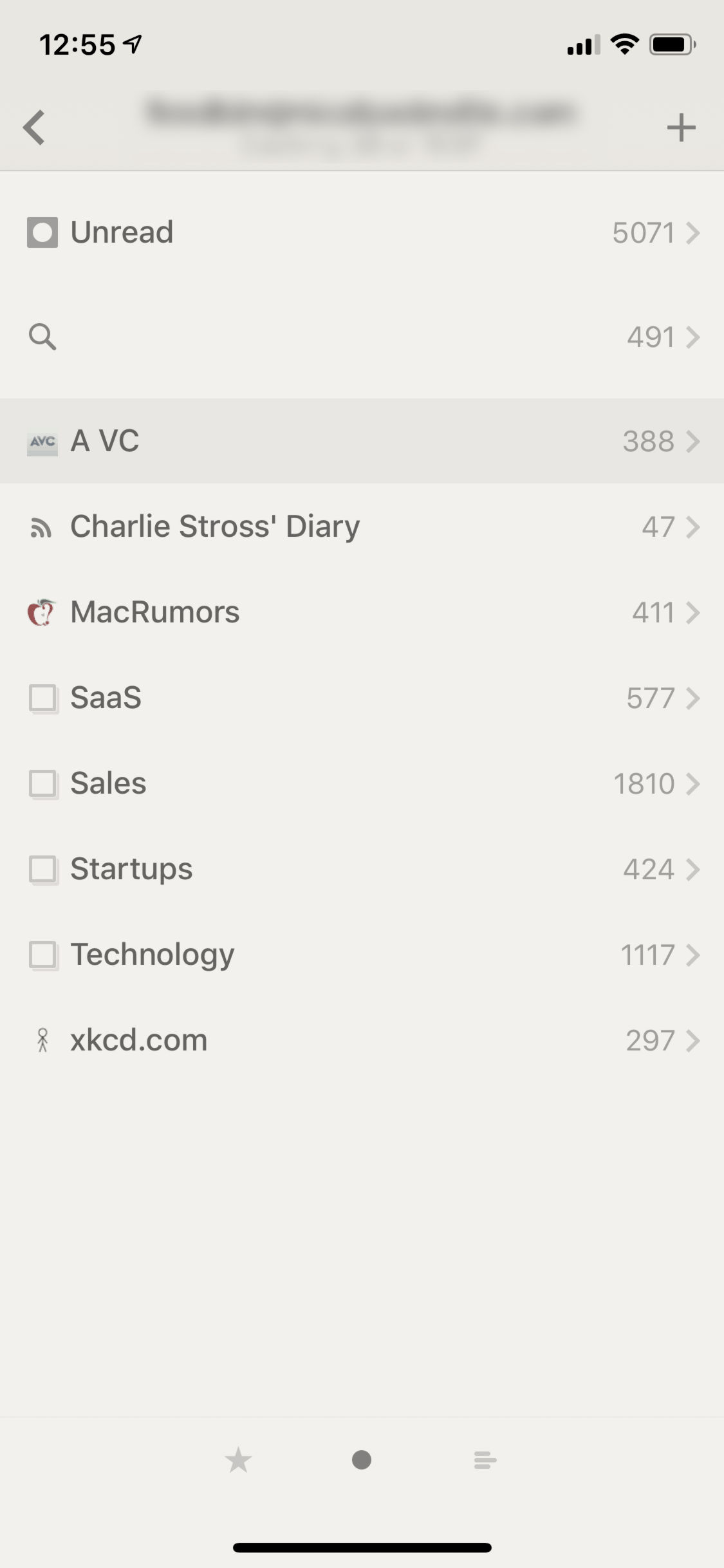
This makes it easy to follow a flurry of blogs, on various topics.
Reading in your own time
A lot of blog posts get shared, especially via social media.
Often I see a blog post that looks interesting, but I do not want to spend the few minutes reading it right there and then (distractions and context-switching are productivity killers – more on that in an upcoming post).
For the last 8 years, I have been using Pocket for that. It allows to save the blog post with 1 click (or tap), and I can then access it later for (offline) reading, in my own time.
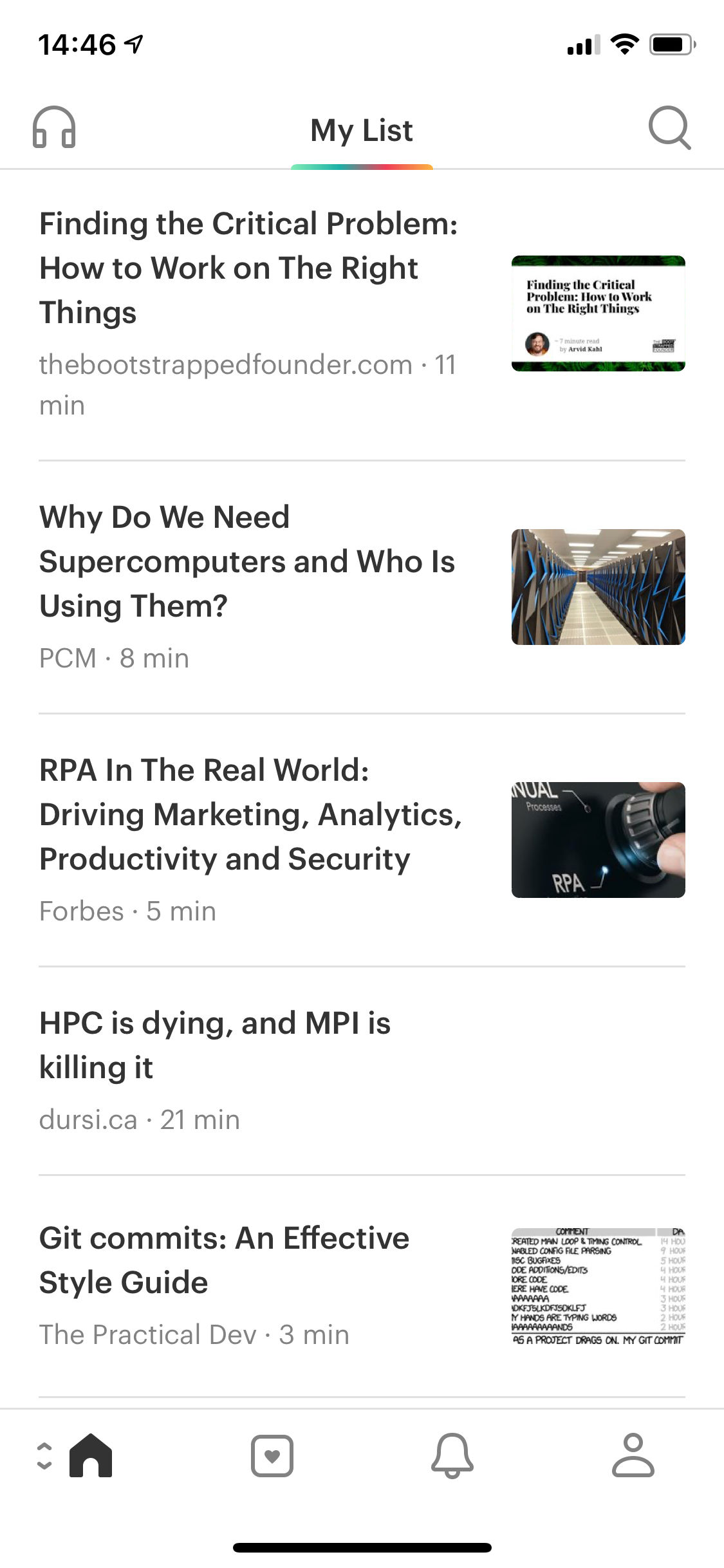
Reading blog posts in my own time with Pocket
The app used to be called “ReadItLater” in its early days, which I found more appropriate.
Learning with podcasts
You have probably witnessed the rise of podcast as a popular way for people to share.
There are podcasts about almost anything these days, and listening to podcasts is easy – just like with audiobooks.
Some of my long-time favourites include Jason Calacanis’ This Week In Startups (American angel investor), Jason Lemkin’s SaaStr (though the appeal drops when he’s not hosting), and IndieHackers.
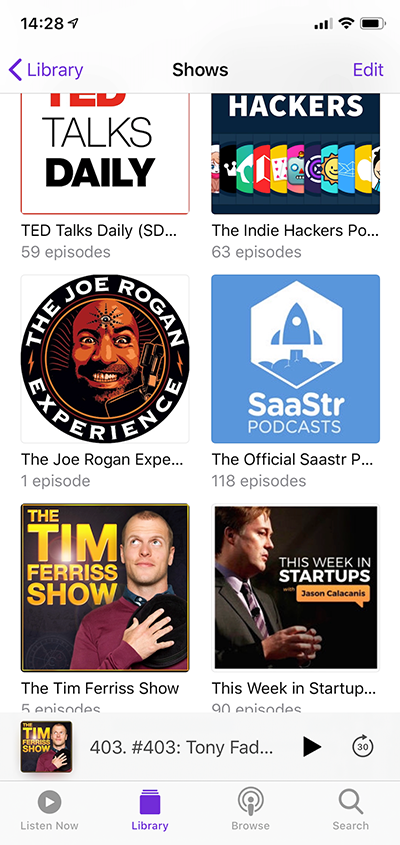
Learning with online courses
To learn actual skills – like programming, using software, writing, SEO, etc.. – online courses are highly effective. I have learned so much with them myself.
My favourite platform: Udemy
Udemy has everything you can think of at $10-15 per course. Just do not buy a course at the “normal” price – Udemy runs sales monthly.
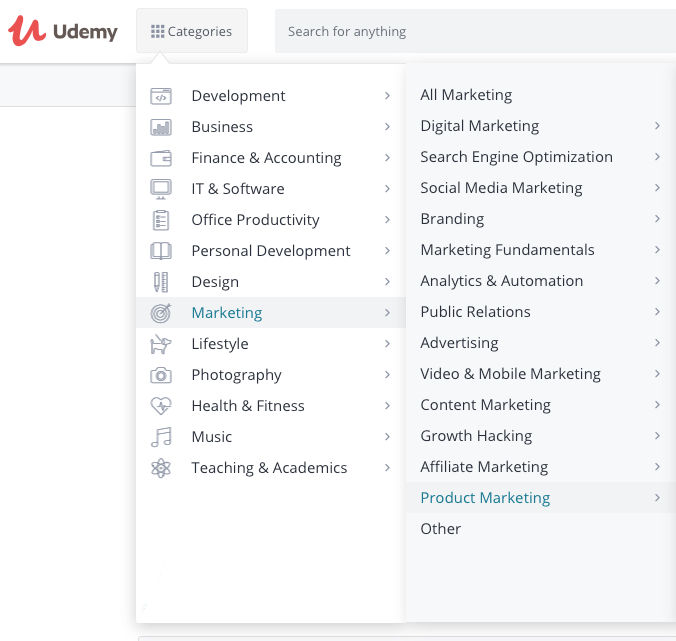
I have now a library of 50+ courses myself, spanning Python and automation, using the Adobe Creative Cloud apps, writing, SEO and more.
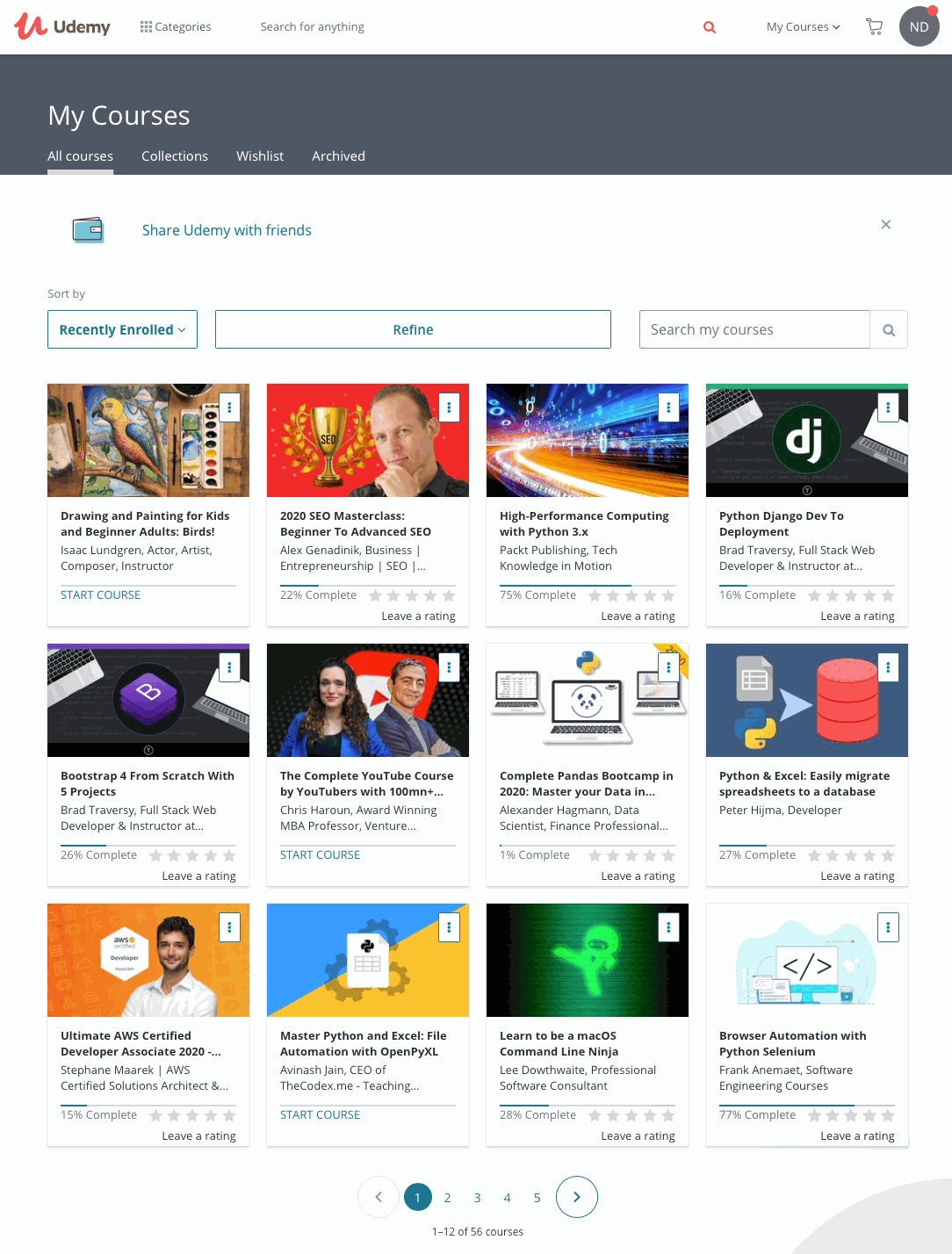
My Udemy course library
Just like every online platform, you can read reviews of the course before buying one. And their refund process is simple, should you not get the value you are expecting (only ever asked once for a refund though).
Note to parents: it’s useful for kids too – my daughter is now starting to learn drawing with a Udemy course! (as you can see from the latest course I bought)
Learning at your own pace
What I like with online courses is
1) Speed setting: you can set the play speed, so you can go through one at 1.5x speed, and just slow down when needed.
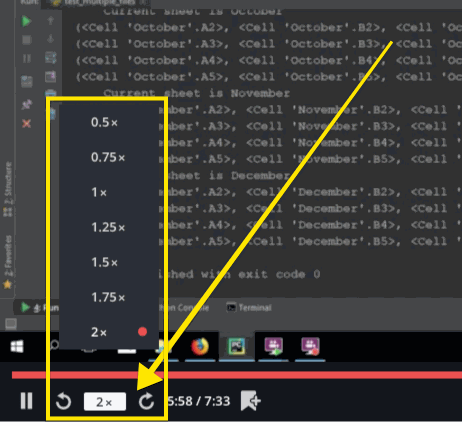
2) Chapters: you can jump to the chapters you need to solve a specific challenge, and browse through everything that is available so you know where to come back when you need something specific.
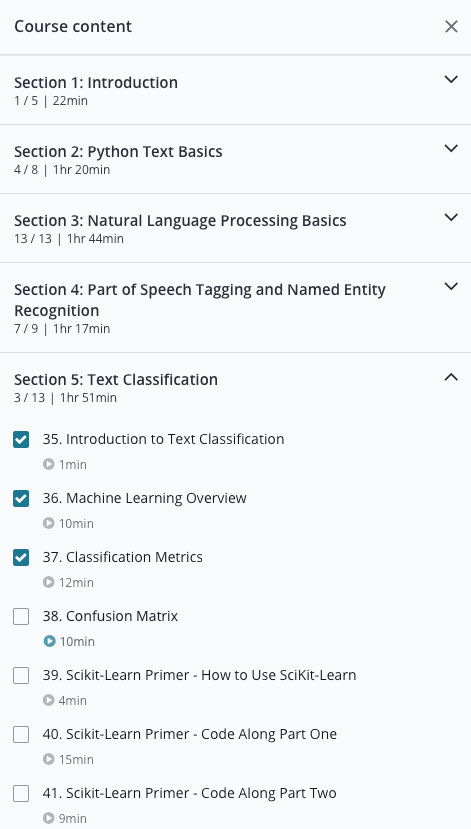
3) Offline watching: courses can be downloaded and watched at your leisure. In a plane, or a remote place – away from distractions.
Other platforms
Beyond Udemy, there are other similar platforms, if you happen to not find what you want there.
Coursera
The other most mentioned online learning platform.
Coursera | Build Skills with Online Courses from Top Institutions
Udacity
The 3rd big player in online learning platforms.
Learn the Latest Tech Skills; Advance Your Career | Udacity
Masterclass
An innovative approach - Masterclass is a subscription-based service, that provides online courses where the teachers are famous world experts.
Examples of what you can learn:
- Acting, from Natalie Portman, Helen Mirren or Samuel L. Jackson
- Filmmaking, from Martin Scorcese, Ron Howard or Spike Lee
- Scientific thinking and communication, from Neil DeGrasse Tyson
- Photography, from Annie Leibovitz
- Producing and Beatmaking, from Timbaland
- Space Exploration, from Chris Hadfield
Free online courses from top universities
Interestingly, in the last few years, more and more universities are publishing some of their classes online for free.
When you think about how much it costs to attend them, it's exciting to now have access to that level of education, for free, anywhere.
See this post for a good list to start with:
Here are 450 Ivy League courses you can take online right now for free
Learning by connecting with experts
Connecting with, asking questions to, and learning from people in the position you covet is a great way to learn. It’s also a way to find mentors and coaches.
Top performers in your organisation
People like to be acknowledged as experts, and usually will share a lot when asked.
Identifying the top performers in your company (or even your CEO), and asking them for their expert advice will get you extremely valuable insights. Dropping the word “expert” in your request usually goes a long way – people like to be acknowledged as experts, and will be usually helpful sharing their knowledge.
You might potentially gain a new mentor that will accompany your progression over years to come.
Don’t believe just me, Reid Hoffman, co-founder of Linkedin said:
“The fastest way to change yourself is to hang out with people who are already the way you want to be.”
Attending Meetups
Meetups are gatherings of like-minded people and experts in a given topic. I have, and still am, attending regularly meetups about Startups, Sales, Python, Automation and technology in general.
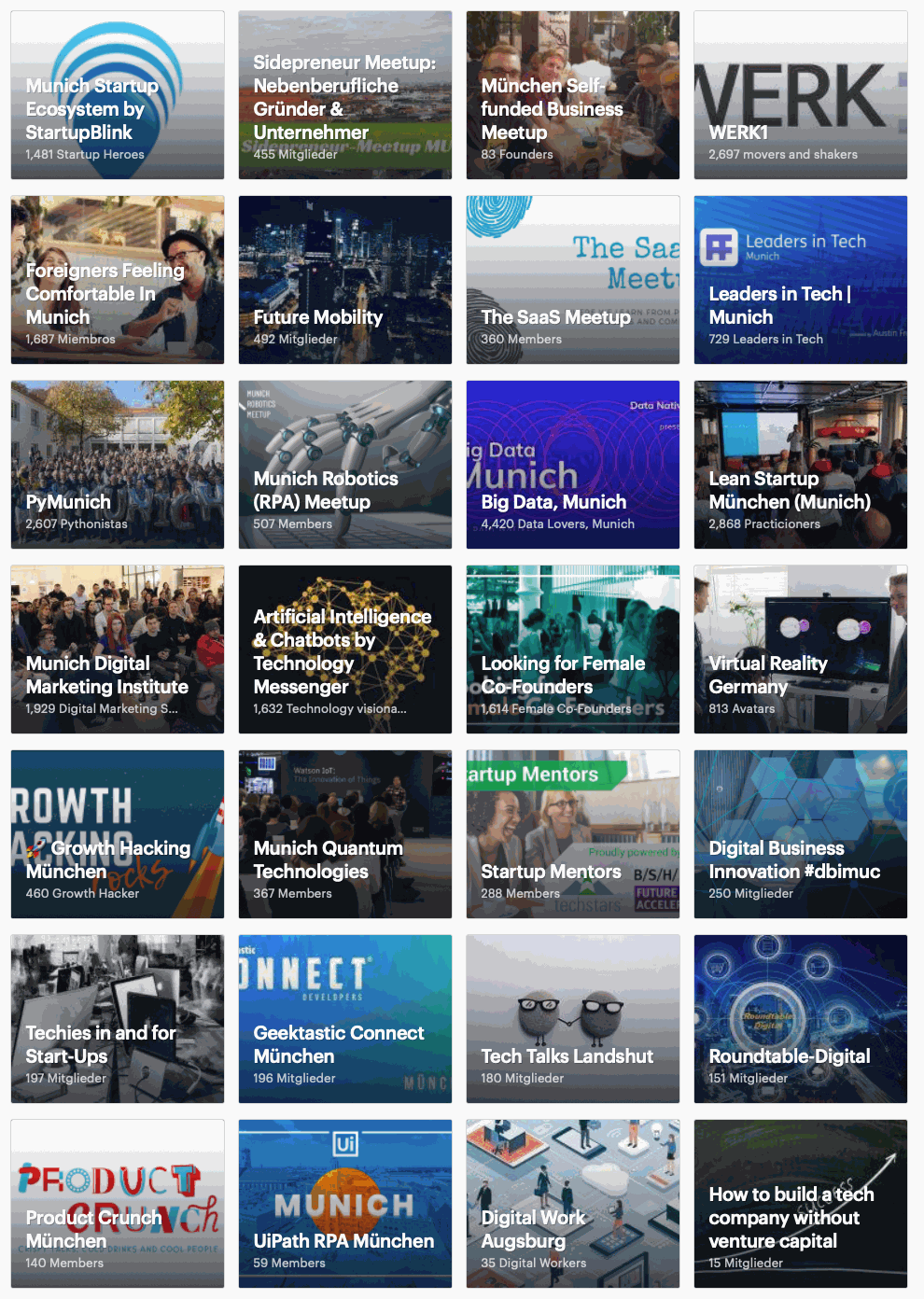
My meetups in Munich
On Meetup, you can find local meetups on the topic you want to learn about, where you will be able to mingle with experts.
Apply the same as above.
Quora, Reddit & Forums
Quora is a question-and-answer website where questions are asked, answered, and edited by users.
“A place to share knowledge and better understand the world”, as they say:
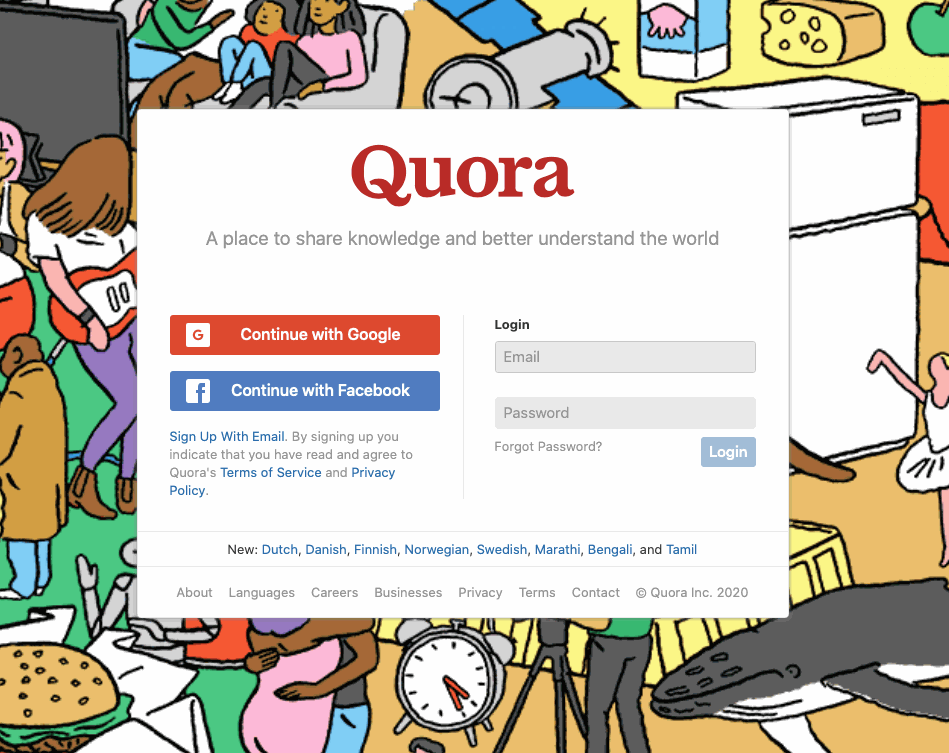
Reddit, which was more about aggregation, is now a powerful discussion website, on all kinds of topics (subreddits).
Forums, or the “old” way for like-minded people to gather on the internet, are still sometimes active places to find experts in a given field.
Lots of experts spend time answering questions on all these channels.
You can post you own questions, or simply learn as a passive user.
Bringing it together
So to recap, learning occurs for me based on 3 pillars:
- Content: reading (or listening) to ready-made content.
- Application: doing (eg building something, or developing a project) which applies the knowledge and gets it to “sink in”.
- People: who can provide an external perspective, and help guide your progression.
It is the combination of all 3 that enable to learn any topic quickly.
Is your head spinning?
There has never been so many and easy ways to access knowledge and learn.
As for me, the more I learn, the more I find more to learn 🤓.
Don’t wait for your company or manager to train and develop you. Invest in yourself and take the time to learn on your own.
It’s the best investment you can make. It compounds over time (says Warren Buffet). No one can take it from you.
The best time to start was yesterday. The next best time is today.
Always Be Learning.. with a goal in mind.
We are supposed to change to survive. Become a butterfly! (sounds cheezy, I know! 😂)
What are your strategies and tactics to learn?


